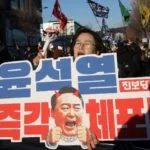
(SEOUL, South Korea) — Investigators abandoned an hours-long effort to detain South Korea’s impeached President Yoon Suk Yeol at his residence in Seoul on Friday, citing thousands of the president’s supporters who rallied outside.
Police vehicles and crowds of the impeached president’s backers were seen outside his home in the South Korean capital. Photos showed protesters lying down in front of police in an attempt to block authorities from the residence.
ABC News confirmed that anti-corruption authorities entered the gate on Yoon’s property, after which a standoff ensued between his security team and police investigators. There were a total of 3,000 police officers on the scene.
Investigators abandoned their effort some five hours after arriving.
“We determined that executing the detention warrant would be practically impossible due to the continued confrontation and suspended the execution out of concern for the safety of on-site personnel caused by the resistance,” the Corruption Investigation Office for High-ranking Officials said in a statement quoted by South Korea’s Yonhap news agency.
“We plan to decide on the next steps following a review,” the CIO added. “We express serious regret over the behavior of the suspect who refused to comply with legally set procedures,” it added.
Yoon’s side described the detention attempt as “an invalid and illegal warrant and strongly regrettable.”
Kwon Young-Se, the interim leader of Yoon’s ruling conservative People Power Party, accused the CIO of unfair, under-the-table dealing with the judge that issued the warrant.
“This is an unfair transaction” secured “through judge shopping,” Kwon told reporters Friday, referring to the fact that the CIO applied for the warrant not at the respective judicial department but rather at a non-related court and to a left-leaning judge, who noted in the warrant that the police could essentially raid a national security facility.
“I can’t help but feel terrible about the disappearance of the rule of law in the Republic of Korea,” Kwon added.
Over 1,000 Yoon supporters remained at the scene waving Korean and American flags after CIO investigators left. Many were holding “Stop the Steal” cardboard signs.
His supporters believe Yoon’s assertion that that the opposition is attempting to steal the presidency, that the opposition leader — who has already been charged in multiple criminal cases — should be arrested first, that the previous election was rigged — which Yoon also insisted when attempting to implement martial law — and that North Korea-backed left-leaning forces in South Korean society are trying to topple the government.
Supporters of the opposition also remained in the area after CIO personnel departed, shouting: “Arrest, arrest, arrest!”
The move to detain Yoon came after a South Korean court issued an arrest and search warrant on Dec. 30 over his short-lived imposition of martial law, ABC News confirmed.
The warrant is valid until Jan. 6, Yonhap reported, meaning investigators hoping to serve it would have to attempt to detain the president again by Monday.
Under South Korea’s constitution, if a sitting president is accused of insurrection, the police have the authority to arrest him while he is still in office.
A joint investigation team sought the warrant on insurrection and abuse of power charges after they said Yoon ignored three summonses to appear for questioning.
The court’s decision to grant the warrant marks the first for a president in the country’s history.
Immediately after the request, Yoon’s attorneys asked the court to dismiss it, claiming that the headquarters “does not have the authority to investigate an insurrection” and that declaring martial law was constitutional.
Yoon declared martial law in a televised speech on Dec. 3. The president said the measure was necessary due to the actions of the country’s liberal opposition, the Democratic Party, which he accused of controlling parliament, sympathizing with North Korea and paralyzing the government.
The move sparked protests, and hours after the declaration, the National Assembly voted to demand that the president lift the martial law order. A majority of parliament — all 190 members who were present, out of the 300-person body — voted to lift the decree — requiring that it then be lifted, under the South Korean constitution.
Following the National Assembly’s vote, Yoon said he withdrew the troops that had been deployed to carry out martial law and “will lift martial law as soon as we have a quorum in the cabinet.” The State Council then convened to vote to officially lift it.
The country’s Democratic Party called on Yoon to resign following what it called the “fundamentally invalid” declaration of martial law. Without Yoon resigning, the opposition party worked to enact impeachment proceedings against the president.
Yoon has been suspended from his position since Dec. 14, when the National Assembly voted for his impeachment in a 204-85 vote.
ABC News’ Kate Lee and Will Gretsky contributed to this report.
Copyright © 2025, ABC Audio. All rights reserved.
